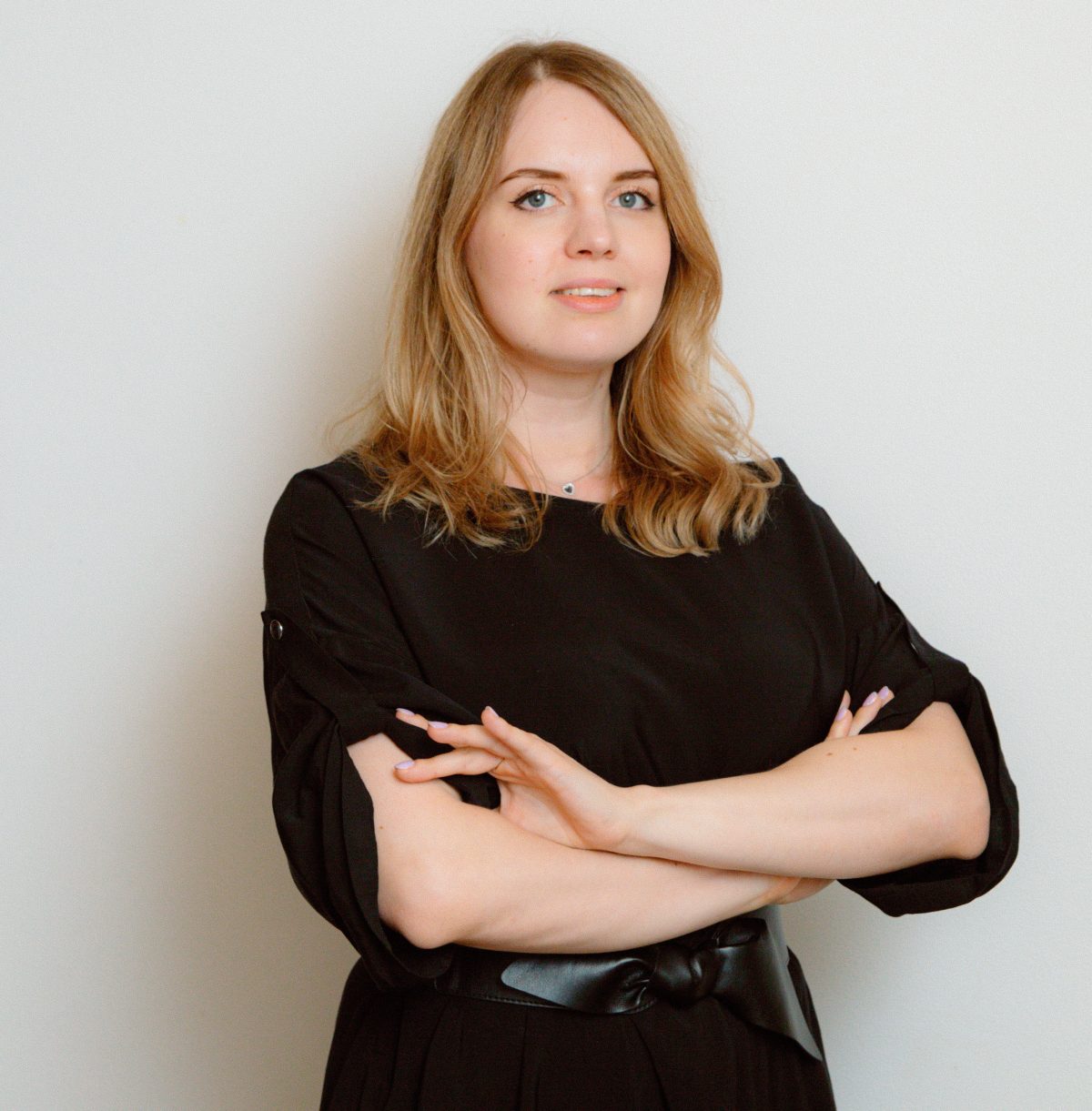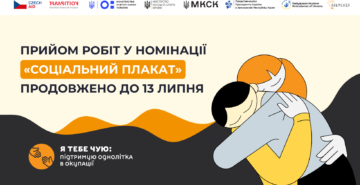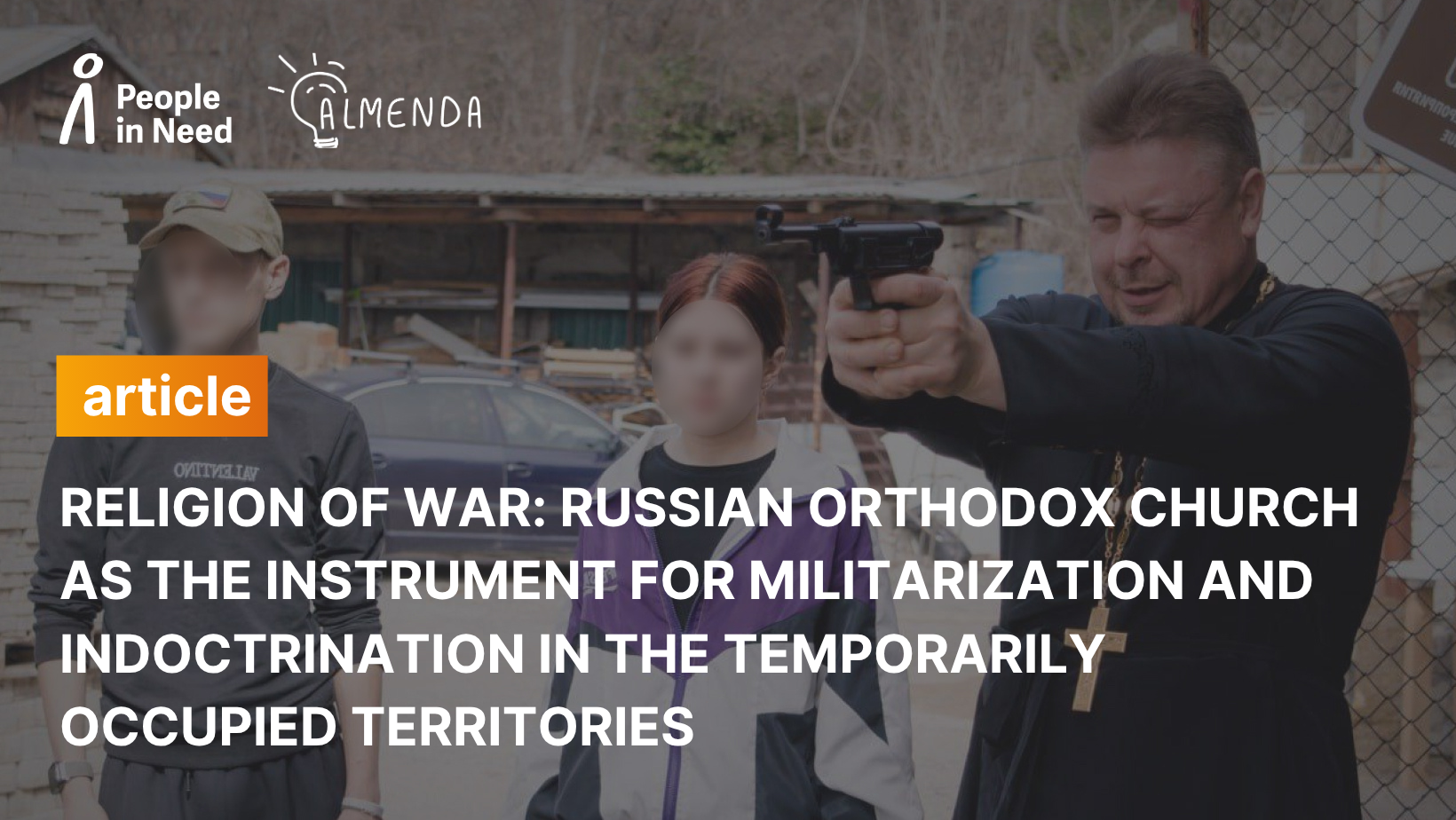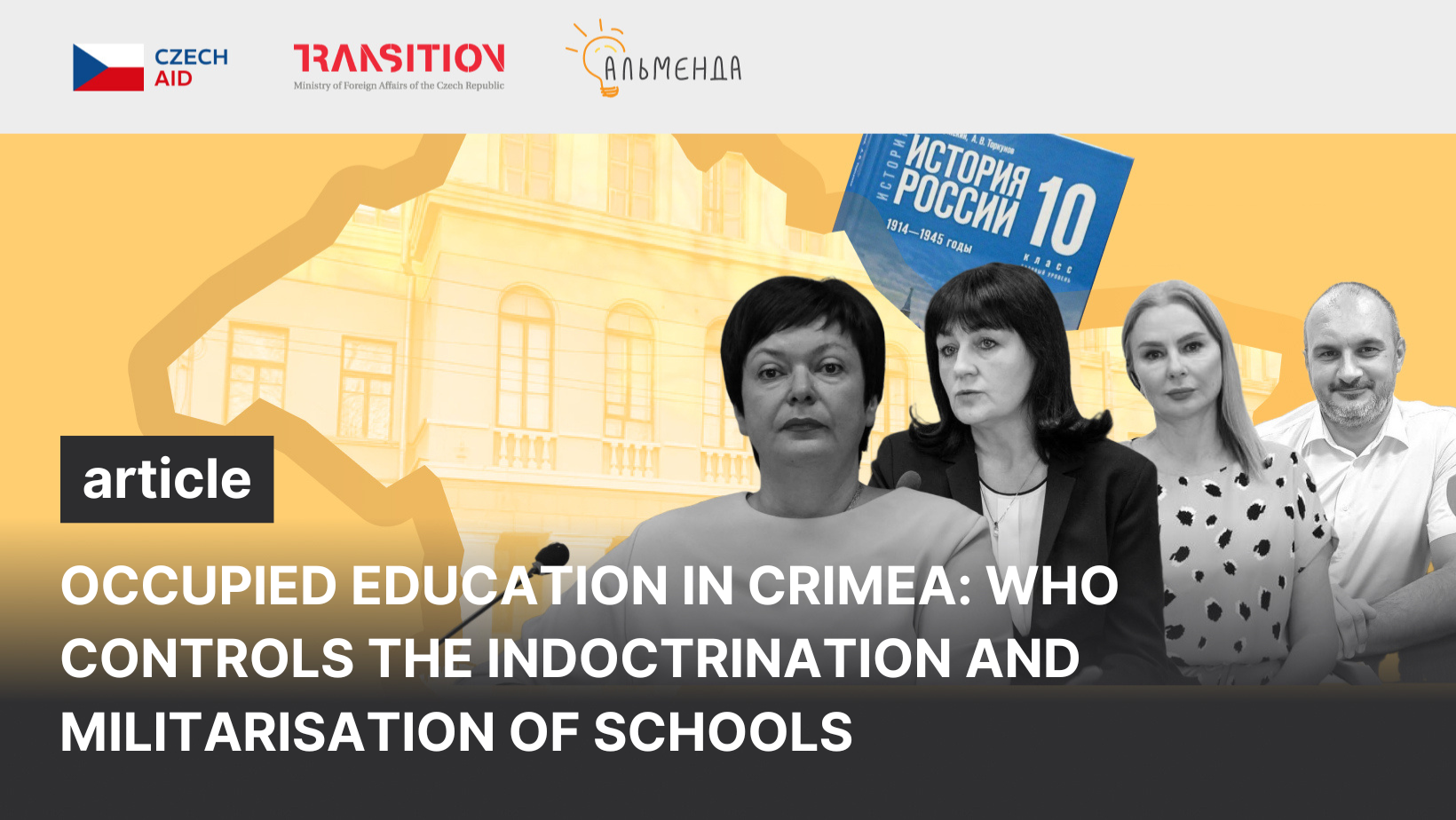

School museums in the occupied South: how Russia uses historical memory as a propaganda vehicle


Author: Anastasiia Vorobiova, the analyst
While studying the instrumentalization of education in the Russia-occupied territories, we repeatedly recorded how the Russian Federation uses distorted historical narratives as the instrument of its own propaganda in the occupied territories. This also applies to teaching history, where Ukraine is called an “ultranationalist state”, and to installation of commemorative plaques to participants of the Russian-Ukrainian war on the facades of secondary education institutions, which should remind Ukrainian children of the “honor” of dying for Russia. From the summer of 2023, the opening of school museums that are supposed to teach “true Russian patriotism” was added to the methods of teaching Ukrainian children the narratives distorted by Russia.
In this material, we will tell why exactly Russia creates school “museums of victory”, such as the “Special Military Operation corner” that appeared in the school of the temporarily occupied city of Skadovsk, and why such actions are illegal from the point of view of international law.
The role of museums
In 2014, the special rapporteur on cultural rights, Farida Shaheed, issued the report on memorialization processes, in which she highlighted the problem of using museums for political purposes, in particular, for propaganda of political aspirations, when the exhibition is used for specific interpretation of historical events. In the context of museums, countries should refrain from political control and financial pressure. Although the status of school museum is different from the classical one, the school museums can have additional responsibility regarding the neutrality of the exhibition, because their location inside the educational institutions presumes an educational function, as their main audience is children, who, in their nature, are more susceptible to external influences.
In other words, the process of memorialization concerns not only purely cultural rights, but is also closely related to personal freedoms, such as the right to freedom of thought, the right to the free expression of views, and in the context of children – the right to identity and the right to education (which is especially relevant for school museums and memorials). The regime of occupation which currently exists in the territory of the Russia-controlled South of Ukraine provides for a very limited opportunity for the occupier state to implement changes in the functioning of the occupied territories, demanding respect for existing laws and orders. According to the logic of international humanitarian law (IHL), these rules should be applied to education, as well as to preserving historical memory – and these are the rules Russia neglects, transferring educational institutions to Russian teaching standards and introducing its own understanding of “historical truth”, enshrined by Russian legislation in institutions of education and culture.
Instead, school museums in Russia are used as another instrument for distorting historical narratives and imposing them on children and youth, as evidenced even by Russian officials themselves. They transfer these practices to the occupied territories of Ukraine in order to educate “true patriots of Russia”.
School museums in the Russian Federation: from historical and cultural institutions to centers of propaganda.
The formation of the state order for creation of museum expositions and exhibitions, aimed at military-patriotic education of youth was stipulated by the Russian “Concept of Patriotic Education” of 2015. The process of instrumentalization of school museums intensified in 2019 through the “School museum of Victory” project, which is being implemented by the Ministry of Education of the Russian Federation, the Moscow “Museum of Victory” and the Russian Military Historical Society. Also, school museums are a part of the federal project “Patriotic education of citizens of the Russian Federation” of the national project “Education”, approved personally by Vladimir Putin.
School museums, which are opened in educational institutions throughout Russia, are “important assistants in the work on preserving cultural and historical memory”, as was stated personally by the Minister of Education of the Russian Federation – Sergey Kravtsov:
“We pay great attention to patriotic education of youth and preservation of cultural and historical memory. School museums are great assistants in this work. They are centers of education and upbringing in educational organizations… Excursions to school museums allow to form children’s moral values, expand their horizons, teach them to treat country’s history with respect” (note – author’s translation).
The first deputy Minister of Education of the Russian Federation, Aleksander Bugaev, said that there are currently 22,000 school museums in Russia, which help instilling “love for the great and small Fatherland” among children and educate “true patriots”. According to Putin’s order, school museums must be opened in every region of the Russian Federation.
The All-Russian program “School museum of Victory” is special – it is dedicated to the history of the so-called “Great Patriotic War”, the myth of which is currently used by the Russian federation to justify the current war against Ukraine [note: Russia is consistently denying its involvement in the Second World War and its role in unleashing the war and dividing Poland according to the Molotov-Ribbentrop pact. Instead, Russia is presenting itself as a victim of Hitler’s “unprovoked aggression” in 1941 and the “world savior from Nazism” as the only true USSR successor state]. By “de-Nazifying” Ukraine during the so-called “special operation”, the Russians are allegedly continuing the “feats of ancestors” during the “Great Patriotic War”. Small museums created in schools, in an “accessible and interesting form” tell schoolchildren about “historical truth of the Great Patriotic War”, about the importance of succession of “feats of grandfathers and great-grandfathers”, who saved the world from Nazism. Participation in the all-Russian program gives access not only to the exhibitions, but also to the on-line program: participation in various activities, forums, quizzes, and teachers are provided with methodological manuals and online lessons.
School museums in the territory of the occupied South of Ukraine
Since June 2023, the “school museum of Victory” program has been operating in the occupied Kherson region, which is implemented with the support of the “United Russia” party. The curator of the project is Oksana Moroz – the member of the Presidium of the Regional Branch of the “United Russia” party and “the Head of the Department of Education of the Skadovsk Municipal District”.
The first exhibition of the “School Museum of Victory” in the occupied part of Kherson region was opened on June 2, 2023, in Henichesk sanatorium boarding school. State Duma deputy, “Secretary of the regional branch of the “United Russia” party”, Igor Kastiukevich noted that museum has not only wall exhibits, but also a whole range of activities in on-line format, including contests, excursions, methodological recommendations, movies and lessons. The exhibition also shows the use of “St. George’s ribbon”, which is banned in Ukraine, and which is a symbol of the Russian aggression.
On June 30, 2023, second “Museum of Victory” was opened in Skadovsk School No. 1, the purpose of which is the formation of “citizens and patriots of Russia with their own values, views, orientations, attitudes, motives of activity and behavior”, as well as “the development of patriotic, civic, spiritual and moral education of schoolchildren” in accordance with the Russian patterns and standards. Participants of the opening ceremony were students of school’s cadet classes (the first cadet class under the patronage of the Investigative Committee of Russia was opened in May 2023), as well as members of “Young Army” and “Movement of the First”. During the ceremony, the above-mentioned curator of the project, Oksana Moroz, emphasized that the history of the “Great Patriotic War” in Russian interpretation is the element of identity, which unites “true Russians” who “always win”. This narrative is particularly dangerous, because the Russian government actively uses the image of succession between a Soviet soldier and the Russian serviceman, and discredits the Ukrainian government as “fascist”, as if the current war is a continuation of the same “Great Patriotic War”.
In September 2023, the third “Museum of Victory” in the region was opened in Prymorska School in the temporarily occupied Skadovsk with the support of the branch of the “United Russia” party in the temporarily occupied Kherson region.
At the time of writing this material, “Museums of Victory” have not been opened in Zaporizhzhia region, but a personnel reserve is already being prepared for their opening. For example, children from the temporarily occupied Melitopol (as well as other territories occupied by Russia), in particular – students of historical special fields, took part in “School of Memory Preservation” of the “Istoki” (“Origins”) forum. The forum takes place with the support of the President of the Russian federation, Vladimir Putin, and the Moscow “Museum of Victory”, which curates the projects related to school “museums of victory”, acted as the general partner of the “School of Memory Preservation” session, therefore, within this program, special attention was paid to volunteer museum work in schools, libraries and higher education institutions.
Also, the “United Russia” party launched the “New School” project in the occupied part of Zaporizhzhia region, which monitors school museums in the region in order to assess their condition and find “better practical solutions for the integration into the All-Russian system of spiritual values”.
“This whole project is aimed at making children really aware of the history that belongs to them and which they are actually a part of. That is because for many years it all was ignored, diverted into other channels. And we are kind of returning to our origins. We are filling what was lost under the previous government” – said Dmitry Savets, principal of Melitopol school No.9 named after Yuri Gagarin (note – author’s translation).
The project was implemented in the schools of the region, in particular, in the museum of Botiyevo school of Pryazovske Raion, where exhibits from the times of the “Great Patriotic War” are presented. In museum of school No. 4, in Voznesenka village, a Russian flag is displayed in the museum premises. In general, school museums actively use Soviet and Russian paraphernalia, thus normalizing it among young residents of the occupied territories.
“Special Military Operation” and patriotism in every school.
In addition to the creation of museums that tell Russian version of the history of World War II, memorials to the “heroes” of the Russian-Ukrainian war, which Russia calls “Special Military Operation”, are created in schools and cultural institutions of the occupied South. That is, a corner of the so-called “Special Military Operation in school museum” was created in Skadovsk school No. 1. Now, among the exhibits, one can see parts of the stricken “Himars” (which allegedly “shot at civilians”) and other ammunition. In the future, the “corner” should be extended with personal stories of “Heroes of the Special Military Operation”.
In Skadovsk school No. 3, the “Partizanskaya Iskra” (“Partisan Spark”) museum was opened, where there is, in particular, an exhibition, dedicated to “Pioneer heroes” – the Soviet glorification of children’s participation in active hostilities. Russian and Soviet symbols are also present in the museum.
“Patriotic corners” are opened not only of purely historical topics. In Skadovsk Children’s Musical School, you can see a portrait of Putin with a Russian Flag, as well as the inscription “Our country is Russia”.
There are patriotic corners dedicated to “Heroes of Special Military Operation” in libraries of Kakhovka district: in libraries of Zelena Rubanivka, Chervony Pid (in 2016 the village was renamed as ‘Zeleny Pid’, but under Russian occupation the old Soviet name ‘Krasny perekopsk’ is being used) Semenivka, Tsukury, Kamianka and Vilna Ukraina, thematic stands were created. In the patriotic corners, located in plain sight, information about participants of the Russian-Ukrainian war was placed.
Conclusion
Russia uses historical memory as the instrument to manipulate the consciousness of residents of the occupied territories, and as a kind of “marker” through which Russia tries to legitimize the occupation of Ukrainian territories – by presenting the current war as “restoring historical truth” and “continuing the fight against Nazism”. School museums dedicated to the topic of the “Great Patriotic War” should popularize this myth among schoolchildren who remained in the occupied territories and are forced to attend schools that teach according to the Russian standards. This can not only be qualified as a violation of the norms of International Humanitarian Law regarding ensuring the “normal functioning of educational institutions”, but also a violation of the children’s rights to preserve their own identity and cultural identity. By visiting Russian exhibitions in school museums and walking past “patriotic corners”, Ukrainian children should acquire the skill of a true Russian patriot who will be ready to follow the “feat of ancestors” who freed the world from Nazism. And since 2014, Russia has been consistently labeling Ukrainians as “Nazis”. Therefore, school “museums of victory” in the occupied territories are so dangerous – because under the wrapping of history of the events that happened 80 years ago children are instilled with a distorted understanding of the present.
The publication was prepared by the “Centre of civil education “Almenda” as part of the “Ruined Childhood: Approaching Justice” project. The content of this publication is the sole responsibility of the NGO “Centre of civil education “Almenda” and does not necessarily reflect the position of Civil Rights Defenders.



